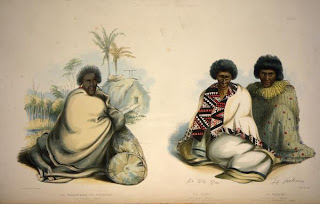Despite this Maori land continued to be alienated. Donald McLean acting on behalf of the Governor was able to buy large areas of land, but not in areas which were most desired by settlers (especially in the Taranaki) remained out of their reach.
 In a reaction to the continued loss of land and the consequent loss of rangatiratanga and mana over their land some Maori began to seek an alternative. The Queen represented the Pakeha, Maori should have their own King. Eventually Te Wherwhero accepted the mantle becoming King Potatau.
In a reaction to the continued loss of land and the consequent loss of rangatiratanga and mana over their land some Maori began to seek an alternative. The Queen represented the Pakeha, Maori should have their own King. Eventually Te Wherwhero accepted the mantle becoming King Potatau.
The Kingitanga represented a challenge to settler aspirations and the Governments purse. For settlers it also represented a defiance of British control of
The King and his supporters saw it in a different light. Besides now representing Maori (the red, black and white threads) he was keen to work with the Government. Because of the perceived threat the Governors however lost faith in him.
 Governor Gore Brown it seems was determined to force the issue of who controlled the country. When Teira offered him land at Waitara it seemed a golden opportunity to show the power of
Governor Gore Brown it seems was determined to force the issue of who controlled the country. When Teira offered him land at Waitara it seemed a golden opportunity to show the power of
When the war broke out the British and settlers found themselves surrounded and penned into New Plymouth. The ring of modern Pa which encircled the town became a challenge which first Colonel Gold then General Pratt unsuccessfully attacked with cannon then sap.
Neither seemed to appreciate the tactic that kept them occupied with relatively unimportant military targets. The war meandered along with the Maori out-digging the Imperial Troops.
The involvement of Kingitanga warriors appeared to confirm the Pakeha belief that the King intended to enforce a Land League and to stand in the way of British law by stopping the sale by Teira of the Waitara. The challenge to the rule of law seems to have been a Government preoccupation, as many settlers recognised the weakness of Teiras claim to the land.





No comments:
Post a Comment